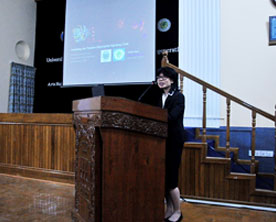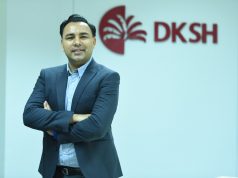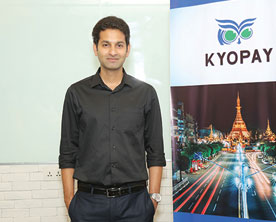Name : Yimon Aye
Position : Assistant Professor of Cornell University
Tell us about your educational background.
I was born and raised in Myanmar. I went through high school here. Kamaryut TTC was my high school. It was, at that time, the education was not so stable. I had an opportunity to study and take exams that are sponsored by the British Council. I was able to achieve high grades in those internationally competitive exams. So I was able to receive a full scholarship to study high school in the UK which is typically known as advanced levels. I took four science subjects.
I did my high school in the UK for about two years. After that, I was also able to receive full scholarship to study Chemistry at Oxford University in England. I spent four years at Oxford University. That was until 2004. After that, I moved to the United State of America and I also got a fellowship to study for my Ph.D. degree at Harvard University in the United State of America (USA). That was a five year Ph.D. program.
At that point, I decided to switch field to learn Biology, especially cancer bio-chemistry at the Massachusetts Institutes of Technology (MIT) in Boston, the same city where Harvard is. After three years of training at MIT, I was able to apply for independent professorship independence of the investigate position across US, and was able to secure my current appointment as an independent investigator and leader as well as an assistant professor job. I have been in this position since mid-2012.
[paypal]
Could you tell us about how you ended up giving a talk at Yangon University?
There is a program called Global Myanmar Forum. As far as I understand, it is a program partly supported by the European Union to promote younger students in Myanmar to appreciate the latest trends in the global scientific arena. Specifically it is called the Association of Advancing Life and Regeneration Method (ALARM) program. The chairman of the program contacted me several years ago but only now could I make it.
What do you think of as your major accomplishments so far?
I haven’t accomplished anything. I don’t know. It is hard to say. That is my general feeling.
There are many people who are doing science. I do appreciate that fact that, for my age group, I have done quite a bit. I think I do not stop here. For me, personally, I constantly ask myself what is the next big challenge. I will say that it is hard for me to pin point my major achievements but I take one step at a time. My overall goal has been to be an educator, a scientist and to be help human society through science.
Let us know about your future plans.
There are not that many people who are trained deeply in chemistry and biology. I am fortunate to be able to run the research program, not just in one specific field, but from Chemistry to Biology to Medicine. My overall plans are to make a strong impact on disease treatments though basic science innovations.
What are the greatest obstacles for you this year?
I guess doing science is not easy. It is difficult and is also expensive. That is the reason why only few countries in the world can do very cutting-edge scientific research. Obviously, that takes effort, great mind, and energy as well.
Naturally, I would like to able to directly contribute to my home land, Myanmar but it would currently be very difficult because of the lack of research infrastructure. So you can probably appreciate that my biggest obstacles are always securing the means to enable me to carry on doing ground breaking research.
How is Myanmar different now compared to the time you left 20 years ago?
It is hugely different. Suddenly, technology makes many things possible. Obviously, I am an outsider now since I have not witnessed all these transitions firsthand. But the changes that have occurred since I left back in late 1990s are very impressive. That was like many years ago.
I think many sectors have undergone changes. Students these days probably have much more global outlook than students in my days. I would like to say they have more stable education; many have opportunities in terms of what kinds of programs they can participate in. For us, I think, when we grew up, the education system was extremely unstable because too many things were happening around us. I think there were a lot of challenges to the generation of students that grew up in my age group. I think that had a very negative impact on the country’s development from education and science perspectives.
What is your solution for Myanmar to get back into research excellence?
I think research is a luxury from economic standpoint. Obviously, it is not a basic need like education, healthcare and infrastructure. I will say those are day to day very important for every citizen. But we need to appreciate that successful scientific research stimulates the economy of any country. So I think leaders and decision makers need to appreciate that science research is important even though it may be a privilege.
Establishing a thriving research program will not happen immediately. But we can start by encouraging the younger generation to learn science. There are a lot of bright and motivated students. I have observed in Myanmar. Their passion for science needs to be nurtured and promoted. Because ultimately, science is one of the big factors that will drive the country’s economy forward and enrich people and the environment.
[/paypal]










